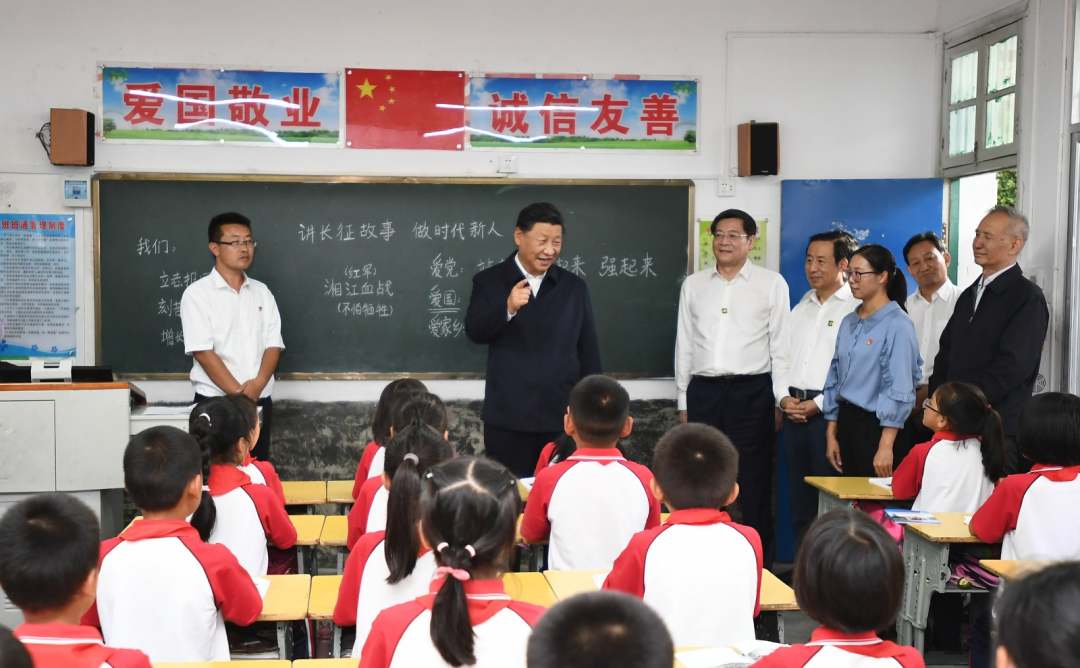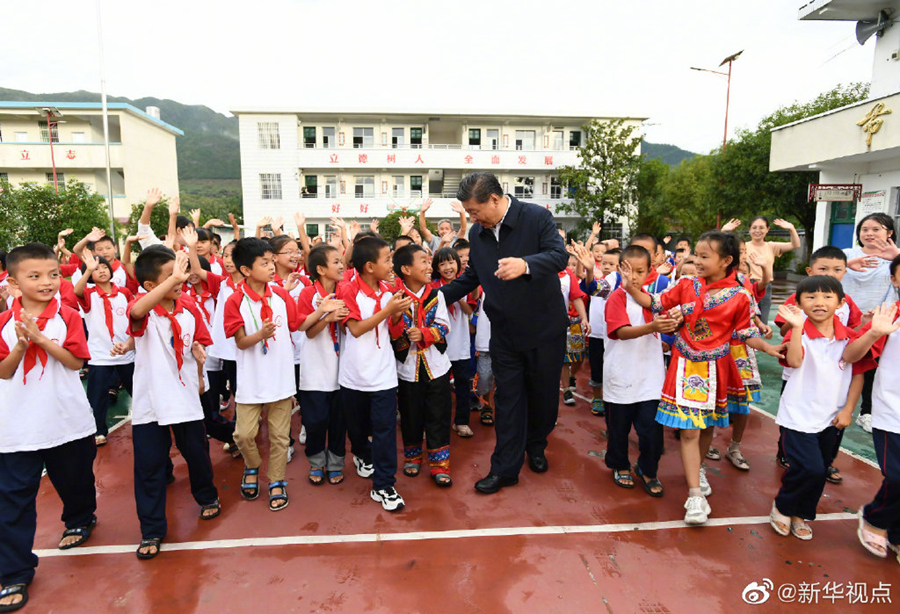
Chinese President Xi Jinping, also general secretary of the Communist Party of China Central Committee and chairman of the Central Military Commission, visits a primary school in Rucheng County, central China's Hunan Province, Sept. 16, 2020. (Photo: Xinhua)
Walking into a classroom of fourth-graders at an elementary school in the county of Rucheng during his inspection tour in Central China's Hunan Province on September 16, 2020, President Xi Jinping was delighted to hear the students share stories of the legendary Long March undertaken by the Red Army in the 1930s. He encouraged rural elementary school students to strive to grow from "saplings" into "towering trees" of the Chinese nation.
Xi told the students that the revolutionary cause must be passed down from one generation to the next, and that the rejuvenation of the Chinese nation will be realized with the participation of today's young generation. Xi expected the students to study hard, make progress every day, and be prepared to join the socialist cause. Communist Party of China (CPC) committees and governments at all levels should care for the grassroots teachers and implement relevant policies in wages, social security, medical care and training.
On that day, Xi hosted a symposium for grassroots representatives. "Yesterday I went to see the elementary school in Rucheng County. There are teaching buildings, dormitories and a canteen. The nutritious lunches are free and students there are very outgoing. It shows that the popularization of compulsory education has been basically finished since reform and opening-up. But imbalances have cropped up in the allocation of educational resources. Therefore, during the 14th Five-Year Plan (2021-2025) period, efforts should be made to solve this problem," Xi said.
In the Luoxiao Mountains at the junction of Hunan, Guangdong and Jiangxi provinces, sunshine penetrates the clouds and bathes the statues of three female Red Army soldiers and old-timer Xu Jiexiu in light. The statues silently tell the touching Long March story of "half a quilt" and the deep love between fish and water. Not far away is the site of the elementary school in Rucheng County in Hunan Province.
More people care about and support the development and construction of schools. The children are growing happy and healthy. Improving grassroots teachers' income is more solid, which helps teachers feel more satisfied and motivated.
Chinese President Xi Jinping, also general secretary of the Communist Party of China Central Committee and chairman of the Central Military Commission, visits a primary school in Rucheng County, central China's Hunan Province, Sept. 16, 2020. (Photo: Xinhua)
Awarding professional titles on retirement
At 7 am sharp the bugle sounded to awaken all students in this primary school.
It was also a reminder for Zhu Xiangrong to go out.
For decades, Zhu has been going out almost every day at this time to work at the school. After working here so long, the school has become a part of his life.
The straight-line distance between home and school is a few hundred meters, but Zhu, an elderly man, makes a point to walk around the periphery of the school a few times every day to see more of the school's grass and brickwork, and to hear more of the children's laughter and reading.
"The school was founded in 1945. At first, it was a quadrangle courtyard. There were no such teaching buildings until it was rebuilt," Zhu told the reporter. "I have been teaching in our village since 1980. In the early years, my salary was not high and my wife helped me support the family."
"There were also only a few teachers in our school and all of us were busy, so getting the chores done also relied on my wife."
In 2014, the situation improved.
"In that year, our salary rose more than 2,000 yuan ($311) a month. Near retirement, after deducting all kinds of insurance, housing provident funds and occupational annuity, the salary exceeded 5,000 yuan ($778), not counting all kinds of allowances," Zhu said. "The treatment of our teachers is getting better and better. In recent years, annual performance awards have been issued and our income is higher and higher year by year!"
Zhou Xinhua, director of the Rucheng County education bureau office, said that the government has issued a reform for the system of awarding professional titles for senior rural teachers. Through assessment, male teachers who have taught in rural schools for 30 years or female teachers who have taught 25 years can be recognized as senior teachers at the grassroots level if they are approaching their retirement age in two years and still teach in rural schools with middle-level titles.
"Luckily, I caught up with the 'green lanes' of awarding professional titles in the year of retirement. I can clearly remember the scene when President Xi came to our school. Xi was concerned about us grassroots teachers and our wages, social security and medical care. It moved me so much!" Zhu Xiangrong said.
Since the implementation of the 13th Five-Year Plan, the policy coverage of rural teachers' living subsidies has been expanding and the number of benefited teachers has been increasing. The subsidy standard has been improving. By 2019, 1,012 regions or counties in non-contiguous poverty-stricken areas have implemented the rural teachers' living subsidy policy. Both their sense of fulfillment and sense of happiness have been enhanced.
Training, growth and progress contribute to the improvement of teaching ability and spiritual prosperity
"Our school is a rural school, small in size and with a small number of teachers. President Xi Jinping came to visit us, which made us happy and excited! With the president's encouragement, we are even more determined to stick to our posts as rural teachers!" school principal Zhu Xifen told the reporter. "After President Xi came, more people cared about our school, more people donated equipment and facilities to us, and more schools came here for teaching exchanges program."
Zhu, a female principal who had been teaching for more than a decade, had eager expectations for studying and taking classes. In recent years, rural teacher training schemes have been promoted and the overall quality of rural teachers has been improved.
"For young teachers, both the sense of stability in material conditions and the sense of fulfillment in growth are important. Training, growth and progress contribute to the improvement of teaching ability and spiritual prosperity," Zhu said.
Comfortable places to live and work
Zhu Xifen and her husband Li Yadong cherish a deep affection for their elementary school at Rucheng County in Hunan Province. When the couple came here from a neighboring school, there were four teachers and a teaching building. The nearby residential building had no water and there was something wrong with the electrics. After work, they had to rush back to the school where they had previously worked. The conditions there were not good either.
In recent years, various places have improved teachers' housing conditions, implemented the teachers' housing provident fund system and promoted the construction of relocation housing. The conditions of the school are gradually improving. "Now our family lives in the school dormitory. We have comfortable conditions to work and live in," Li said.
Pan Jiuren, the vice principal of another elementary school in Hunan province, excitedly recalled the scene when he attended the symposium hosted by President Xi. "I'm a native of this region. As a rural teacher who has been teaching nearly 30 years, I have witnessed the progress and changes of local education," Pan said.
In the fall of 2020, teaching buildings, student dormitories and official buildings were equipped with canopies to combat the rain. The classrooms were equipped with electronic whiteboards.
"Behind these changes was a more important change," said Pan. "Teachers are more energetic, have a deeper understanding of teaching and educating people, and have a stronger belief!"
(Translated by He Jinying and edited by Wang Zi and Bao Han)


